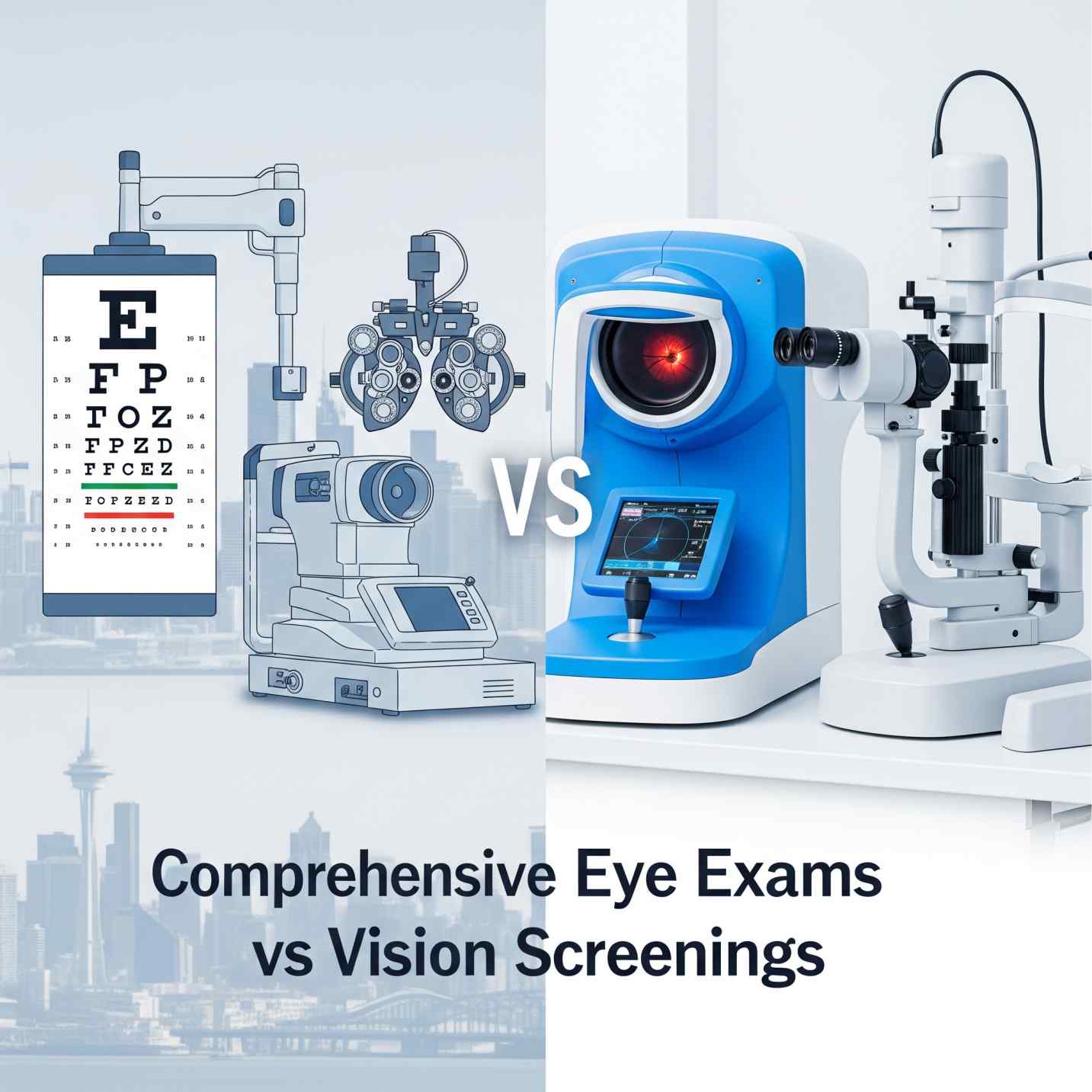Choosing Eye Doctors: Optometrist vs. Ophthalmologist
Optometrist vs. Ophthalmologist: Who Should You See?. Confused about eye care? Discover the key differences between optometrists and ophthalmologists—and learn who’s right for your vision needs in Seattle.
What Is an Optometrist? Your Primary Eye Doctor Explained
Optometrists are your primary eye care providers, specializing in vision health and non-surgical treatments. To become an optometrist, they earn a Doctor of Optometry (OD) degree. This requires four years of specialized optometry school after completing an undergraduate degree.
What Does an Optometrist Do? Core Responsibilities:
Your optometrist handles essential vision care, including:
-
Performing comprehensive eye exams to assess vision and eye health.
-
Prescribing corrective lenses (glasses and contact lenses).
-
Diagnosing and managing common eye conditions (e.g., dry eye, nearsightedness, astigmatism).
-
Detecting early signs of serious eye diseases like glaucoma or diabetic retinopathy.
-
Prescribing medications for eye-related issues.
Think of your optometrist as your essential partner for routine vision care and managing eye health without surgery.
What Is an Ophthalmologist? Your Medical and Surgical Eye Specialist
Ophthalmologists are medical doctors (MD or DO) specializing in comprehensive eye care, including medical treatment and surgery. Their extensive training pathway involves:
-
Completing medical school.
-
A one-year medical or surgical internship.
-
A minimum three-year residency focused solely on ophthalmology.
-
Often, additional fellowship training in subspecialties like retina, cornea, or oculoplastics.
What Does an Ophthalmologist Do? Key Capabilities:
As physicians and surgeons of the eye, ophthalmologists:
-
Diagnose and treat the full spectrum of eye diseases (from common to rare).
-
Perform eye surgeries, including cataract removal, LASIK, glaucoma procedures, and retinal repair.
-
Manage complex, chronic, and sight-threatening eye conditions.
-
Prescribe all necessary medications and order advanced diagnostic testing.
Ophthalmologists provide the highest level of medical and surgical eye care, essential for serious, advanced, or complex eye health issues.
Optometrist vs. Ophthalmologist: Key Differences at a Glance
Understanding the distinct roles of these eye care professionals helps you know who to see for your needs. Here’s a clear comparison:
-
Education & Training:
-
Optometrist: Earns Doctor of Optometry (OD) degree after 4 years of optometry school (post-undergrad).
-
Ophthalmologist: Completes medical school (MD/DO), 1-year internship, + 3+ year ophthalmology residency.
-
-
Scope of Practice:
-
Optometrist: Focuses on primary vision care (eye exams, glasses/contacts) and managing common eye conditions.
-
Ophthalmologist: Provides full medical/surgical eye care, treating complex diseases and performing surgery.
-
-
Surgical Care:
-
Optometrist: Does not perform surgery.
-
Ophthalmologist: Performs all eye surgeries (cataract, LASIK, retinal procedures).
-
-
Medication Authority:
-
Optometrist: Can prescribe some medications for eye issues.
-
Ophthalmologist: Can prescribe all eye medications and treatments.
-
-
Primary Role:
-
Optometrist: Your first stop for routine care, vision correction, and early detection.
-
Ophthalmologist: Manages advanced/surgical cases referred by optometrists.
-
Optometrist or Ophthalmologist? Your Guide to Choosing the Right Eye Doctor
Knowing whether to see an optometrist or ophthalmologist ensures you get the best care for your needs. Here’s when to choose each specialist:
See Your Optometrist For:
-
Routine eye exams and vision testing
-
Glasses or contact lens prescriptions and fittings
-
Minor eye irritations (dry eye, allergies, infections)
-
Managing common conditions (nearsightedness, astigmatism, early dry eye)
See Your Ophthalmologist For:
-
Symptoms of serious eye diseases (glaucoma, cataracts, macular degeneration)
-
Any need for eye surgery (cataract removal, LASIK, retinal procedures)
-
Eye trauma, injury, or sudden vision changes/loss
-
Chronic, complex, or sight-threatening conditions requiring advanced care
Seamless Care at Cannon EyeCare, Seattle
Our optometrists and ophthalmologists collaborate closely, ensuring you always receive the right level of care – whether routine vision needs or specialized surgical treatment – at the perfect time.
Common Eye Conditions: Which Specialist Manages What?
Knowing which eye professional handles specific conditions ensures you get the right care faster. Here’s a clear breakdown:
-
Glaucoma:
-
Optometrist: Detects early signs during routine exams.
-
Ophthalmologist: Provides treatment and performs surgery.
-
-
Cataracts:
-
Optometrist: Diagnoses during comprehensive eye exams.
-
Ophthalmologist: Performs surgical removal.
-
-
Macular Degeneration:
-
Ophthalmologist: Manages medical treatment.
-
-
Dry Eye & Allergies:
-
Optometrist: Typically handles ongoing management.
-
-
Eye Injuries:
-
Ophthalmologist: Delivers immediate emergency care.
-
Teamwork for Your Eyes: How Optometrists & Ophthalmologists Collaborate
At Cannon EyeCare in Seattle, our integrated eye care team works together seamlessly to protect your vision. Here’s how our specialists collaborate:
-
Your Optometrist’s Role:
-
Provides primary eye care (routine exams, vision correction).
-
Acts as your first point of contact, referring you to ophthalmologists when advanced treatment or surgery is needed.
-
-
Your Ophthalmologist’s Role:
-
Performs eye surgeries and manages complex diseases (e.g., glaucoma, retinal conditions).
-
Provides updates to your optometrist post-treatment for continuity.
-
-
Our Collaborative Advantage:
-
Continuous communication between both specialists.
-
Shared medical records ensure personalized, comprehensive care.
-
One coordinated team for all stages of your eye health journey.
-
This partnership means you get the right expertise at every step – from routine check-ups to complex surgical care – all within the Cannon EyeCare family.
FAQs
-
Who Should I See for Routine Eye Exams in Seattle?
Visit a Seattle optometrist like those at Cannon EyeCare for annual exams, prescription updates, and screenings for conditions like glaucoma or dry eye. Optometrists are primary eye care providers and coordinate referrals to Seattle ophthalmologists if surgery is needed.
-
What Conditions Do Seattle Ophthalmologists Treat?
-
Where Can I Get Cataract Surgery?
-
Why Choose an Optometrist Over an Ophthalmologist for Dry Eye?
-
Will My Insurance Cover a Seattle Optometrist Visit?
-
What’s the Difference Between an OD and MD in Eye Care?
-
Can Optometrist Prescribe Medications?
-
How long is the training for optometrists versus ophthalmologists?
-
What types of eye care services does an optometrist provide?
-
Which eye doctor should I see for routine vision checkups?
-
Do ophthalmologists specialize in certain eye conditions?
-
How do I know if I need an optometrist or an ophthalmologist?
-
Are ophthalmologists also able to prescribe glasses and contacts?
-
What should I expect during a visit to an ophthalmologist?


